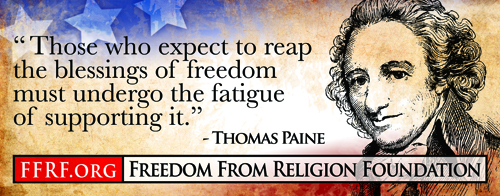
Although it may not be obvious at first glance, a pending voting reform bill will not only accomplish political change but will also help protect our First Amendment and keep state and church separate.
HR1, also known as “For the People Act,” would “expand Americans’ access to the ballot box, reduce the influence of big money in politics, strengthen ethics rules for public servants and implement other anti-corruption measures for the purpose of fortifying our democracy.” The House recently passed the sweeping election bill, but it faces likely roadblocks, such as a filibuster, in the Senate.
How will HR1 buttress the First Amendment’s Establishment Clause? “Anything that reduces the influence of money in politics and strengthens ethics rules will help us keep state and church separate,” explains FFRF Director of Strategic Response Andrew Seidel.
It is eye-opening to examine who opposes the bill. Christian nationalists, theocrats and the Religious Right want fewer ethics rules and fewer voters because they want more influence. They are afraid of the For the People Act, HR1, for all the reasons FFRF is excited by its promise. It isn’t a coincidence that the architect of the most disastrous campaign finance judicial decision of all time, Citizens United, is a virulent Christian nationalist group that, along with Mike Huckabee, attacked FFRF in a 10-page letter sent out to 2 million Americans.
Anti-abortion groups also oppose HR1, launching a $5 million disinformation campaign against it, with Ken Cuccinelli, an authoritarian Christian nationalist, leading this charge. They understand that their anti-choice agenda will fail in a country where three-quarters of the people support reproductive rights — if all voters get an equal say in elections.
Yet another ardent critic of HR1 is our previous president, who used his podium at the recent, shameful gathering at CPAC not only to promote his Christian nationalist playbook, but to attack the bill. He warned against those who “are racing to pass a flagrantly unconstitutional attack on the First Amendment and the integrity of our elections known as HR1.”
A vibrant, fully enfranchised electorate is the best guarantee to protect our secular Constitution and secular government. A diverse electorate ensures that no sect or group can take charge of the government to privilege itself. The framers called this the “mischiefs of faction” in The Federalist #10. Madison used as an example the risk that a “religious sect may degenerate into a political faction,” advising that “the variety of sects dispersed over the entire face of it must secure the national councils against any danger.” Put more simply, pluralism is one of the best antidotes to Christian nationalism.
The pandemic has made clear that universal vote by mail is a secular issue — it not only helps enfranchise secular voters (who tend to be older) and concentrate our clout, but it is public policy based on reason and science. Last April, the voter suppression efforts sweeping the country landed on the doorstep of the Freedom From Religion Foundation during the debacle that was Wisconsin’s in-person primary election. Several FFRF staff members were forced to risk their health or even lives — and the lives of their families — to vote in person during a pandemic after their timely requests for absentee ballots never arrived. The Wisconsin and U.S. Supreme Courts forced the state’s voters to violate stay-at-home orders and risk health to exercise their constitutional right to vote. That must not be allowed to happen again.
Unfortunately, state legislatures around the country are rushing to disenfranchise as many voters as possible — to date more than 350 bills in 43 states propose to tighten voting rules. Meanwhile, more than 700 bills have been introduced to improve voting access.
Some voting restriction proposals are even explicitly tied to religion. In Georgia, where a number of Black citizens traditionally cast ballots after church services in a “Souls to the Polls” campaign, the Georgia house has passed HB531, the “Sabbath commandment,” to prevent early voting on weekends. Voter suppressionists know a racial restriction won’t stand up, but presume a violation of the constitutional principle of separation between state and church will. A bill outlawing voting on Sunday would also target observant Jewish voters, whose Sabbath is Saturday. The bill would also make it harder to vote in terms of ID, drop boxes, absentee ballots and deadlines, runoffs — and much, much more.
Fighting for a secular government means fighting for policies based on reason, science, data, but also fairness. Many of the attempts to suppress votes are obviously unfair, but they’re also based on a Big Lie: voter fraud. This is a lie pushed by Christian nationalists to help them codify and solidify their power and privilege, as FFRF has documented about the attack on the Capitol.
The Freedom From Religion Foundation works so that reason and fairness — not religion — will prevail in government. HR1 will help us reach that goal.
“White Christian nationalism has benefitted for decades from undemocratic structures in our republic,” says FFRF Co-President Dan Barker. “It’s time to change that. It’s time for the Senate to pass HR1.”

